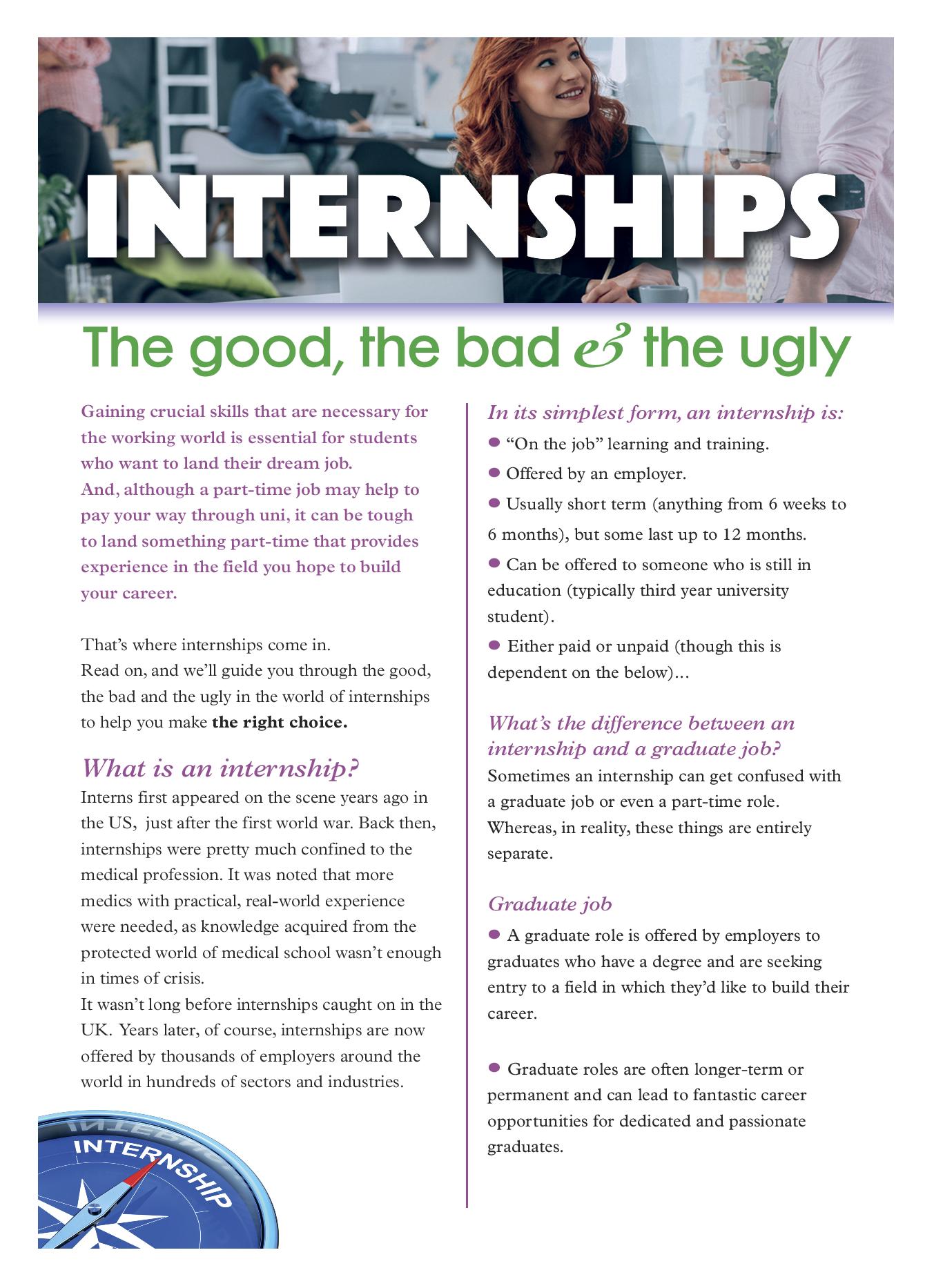
Internships: The Good, The Bad & The Ugly
- May 28, 2018
- Marketing Team

Gaining crucial skills that are necessary for the working world is essential for students who want to land their dream job. And, although a part-time job may help to pay your way through uni, it can be tough to land something part-time that provides experience in the field you hope to build your career.
That’s where internships come in. Read on, and we’ll guide you through the good, the bad and the ugly in the world of internships to help you make the right choice.
What is an internship?
Interns first appeared on the scene years ago in the US, just after the first world war. Back then, internships were pretty much confined to the medical profession. It was noted that more medics with practical, real-world experience were needed, as knowledge acquired from the protected world of medical school wasn’t enough in times of crisis.
It wasn’t long before internships caught on in the UK. Years later, of course, internships are now offered by thousands of employers around the world in hundreds of sectors and industries.
In its simplest form, an internship is:
– “On the job” learning and training
– Offered by an employer
– Usually short term (anything from 6 weeks to 6 months), but some last up to 12 months.
– Can be offered to someone who is still in education (typically third year university student)
– either paid or unpaid (though this is dependent on the below)
What’s the difference between internship and graduate job?
Sometimes an internship can get confused with a graduate job or even a part-time role. Whereas, in reality, these things are entirely separate.
Graduate job
– A graduate role is offered by employers to graduates who have a degree and are seeking entry to a field in which they’d like to build their career.
– Graduate roles are often longer-term or permanent and can lead to fantastic career opportunities for dedicated and passionate graduates.
Internship
– Internships are typically offered to students in their penultimate year of university or after graduating. And, usually, is valuable work experience in a sector that relates to a student’s studies.
– Internships are often shorter-term assignments, contracts or project work. Some are taken place over the summer holiday and can be either paid or unpaid.
Should I be paid for an internship?
Whether or not an intern should be paid for their work has been the subject of heated debate for years. Famously, in 2013, unpaid interns protested against alleged exploitative practices at London Fashion Week. And, more and more universities are monitoring their job boards for unscrupulous practices by employers who merely wish to take advantage of an unpaid labour pool.
However, steering away from emotional reasoning, here are the cold, hard facts.
– If an intern has a contract, receives benefits in kind, they have to turn up for work even if they don’t want to (because otherwise they’ll be fired), or they are working under the promise of future paid work, then the intern is classed as a worker.
– Workers are entitled to be paid at least the national minimum wage.
– On the flip side, interns are not entitled to pay if they are classed as voluntary workers (working for a charity or registered not-for-profit enterprise), or if they are under 16 and on a work experience placement.
– Additionally, an employer doesn’t have to pay an intern if the intern is not actually doing any work. For example, if they are only observing or shadowing another member of staff.
If you are unsure whether or not your internship should be paid, or if you feel you are being exploited as an unpaid worker, you can contact acas for further advice on your legal rights.
Where to find an internship
If you’re excited about the prospect of securing your first (second or third!) internship, it can be tough to know where to start looking. Luckily, there are many options available for you.
Firstly, your university career centre or jobs fairs organised by the university can be a great place to start.
It’s also very common for students to find internships within a family business or through family/friendship connections. And, it’s been known for students to be offered an internship through other external interests, such as clubs or societies.
For students looking for relevant, meaningful internships in the field they wish to build a career, specialist student and graduate job boards are also excellent hunting grounds for suitable opportunities.
If you have a more adventurous spirit, it may also be worth investigating internships or volunteer placements abroad. Cultural and language skills, as well as a more ‘worldly’ view, are often favourably looked on by potential employers.
Get the most out of your internship
Before you start an internship, here are a few quick hints to help you get the most of your experience and make a great impression with a potential employer.
1. Avoid surprises. Always, always check whether your internship is paid or unpaid, before you start work.
2. Show up on time. Interns can get a bad rap for punctuality. Don’t be one of them.
3. Be excellent. Do everything asked of you to the very best of your ability.
4. Do more. Run out of things to do? Then do more. Find and ask for work.
5. Be curious. If you don’t understand something, then ask. If you do understand something but think it could be done another way, then say so (politely).
6. Learn. This is your internship. Learn as much as you can from it. The more you learn the better decisions you can make about your future.
7. Pay attention. There is nothing worse for a manager than to have to explain things more than twice to an intern who should have been listening.
8. Own up. If you make a mistake, don’t panic. Always own up and ask how you can rectify it.
9. Have fun. Internships are rare opportunities only afforded to students. Once you graduate, there’s no turning back. So, enjoy it!
Libby Calaby writes for Inspiring Interns, which is a recruitment agency specialising in all the internships and graduate jobs London has to offer.









